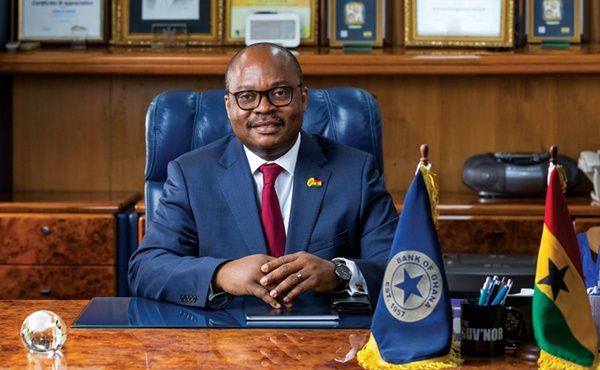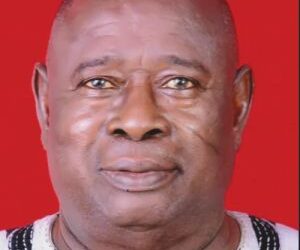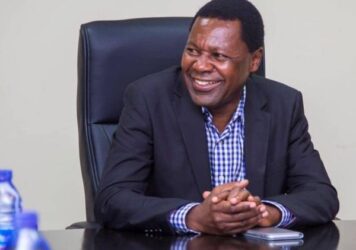BoG Has Strong Buffers To Support Cedi — Governor | Business News
[ad_1]
The Governor of the Bank of Ghana (BoG), Dr Ernest Addison, has given an assurance that the central bank has strong buffers to support the Cedi despite the local currency depreciating by 6.8 per cent in the first quarter of the year.
He said with the gross international reserves increasing to $6.2 billion at the end of February this year, the BoG had enough buffers to support the recovery of the local currency.
Addressing a press conference in Accra yesterday after the 117th sitting of the Monetary Policy Committee (MPC) of the BoG, Dr Addison said the depreciation of the Cedi in the first quarter was as a result of some seasonal pressures last month and early March 2024.
He said the pressures emanated mainly from the strengthening of the United States dollar in international markets and payments the BoG made for the energy and corporate sectors.
“What we are seeing is a significant improvement; the currency is relatively stable in the first quarter of 2024 and we should expect that relative stability to continue on the basis of the fact that we have stronger buffers,” the Governor said.
“We have cleared a lot of energy sector arrears, although we received $600 million second tranche of IMF money, we have over $444 million to settle energy sector arrears but at the end of February we are still reporting a strong reserve so this should give some assurance that the Cedi is relatively stable,” Dr Addison stated.
“These were compounded by delays and uncertainties associated with the second tranche of the cocoa loan inflow and World Bank’s disbursement of Budget Support,” he stated.
Mitigation measures
The Governor said those pressures had, however, been mitigated by continued inflows from remittances and mining companies and from the Domestic Gold Purchase Programme.
He said the central bank had been present in the foreign exchange market through its weekly $20 million auction to Bulk Oil Distribution Companies (BDCs) and other means.
Policy rate
On the balance of happenings in the economy, the MPC maintained its benchmark interest rate at 29 per cent, citing risks to inflation.
The Governor said risks to inflation were slightly on the upside and would require close monitoring.
Given those considerations, the committee decided to maintain the Monetary Policy Rate at 29 per cent, Dr Addison said.
This means that the cost of borrowing, which ranges between 32.5 per cent and 33.5 per cent, will not change much in the next few months.
Balance of payments
Providing an update on national accounts, Dr Addison said provisional Balance of Payments outcome for 2023 showed an overall surplus of $0.46 billion (or $460 million) compared to a deficit of $3.41 billion in 2022.
He said the development was driven mainly by lower income payments, lower outflows from the capital account and higher remittance inflows.
Those, Dr Addison pointed out, were supported by policies, including inflows from the gold purchase programme, stepped-up foreign exchange purchases from the mines and oil companies, the first tranche of the International Monetary Fund-supported programme, higher remittance inflows and lower outflows from the debt standstill.
As a result, the current account recorded a surplus of $1.11 billion last year, in contrast to a deficit of $1.52 billion in 2022, he added.
The Governor further stated that the current account also recorded a surplus of $0.46 billion last year compared to a deficit of $1.52 billion in 2022, reflecting lower outflows due to the standstill in external debt servicing.
The services account showed a net payment of $3.40 billion, compared to a net payment of $3.46 billion in 2022.
Net income payments in 2023 also dropped to $2.08 billion from $4.51 billion in 2022, with interest payments on public debt reducing sharply by 89.5 per cent to $0.17 billion in 2023 from $1.69 billion in 2022.
At the same time, remittance flows grew by 10.1 per cent to $3.93 billion.
Capital account
Dr Addison said the country’s capital and financial account also saw reduced outflows, with total capital and financial outflows amounting to $0.76 billion, far lower than outflows of $2.14 billion recorded in 2022.
Portfolio (cross-border securities investment) outflows also amounted to $0.28 billion in 2023 compared with an outflow of $2.06 billion recorded in 2022.
Government debt amortization dropped to $0.58 billion in 2023 from $1.09 billion on the back of the debt standstill announced in December 2022.
Source: graphic.com.gh
| Disclaimer: Opinions expressed here are those of the writers and do not reflect those of Peacefmonline.com. Peacefmonline.com accepts no responsibility legal or otherwise for their accuracy of content. Please report any inappropriate content to us, and we will evaluate it as a matter of priority. |
Featured Video
[ad_2]
Source link













Leave a Reply